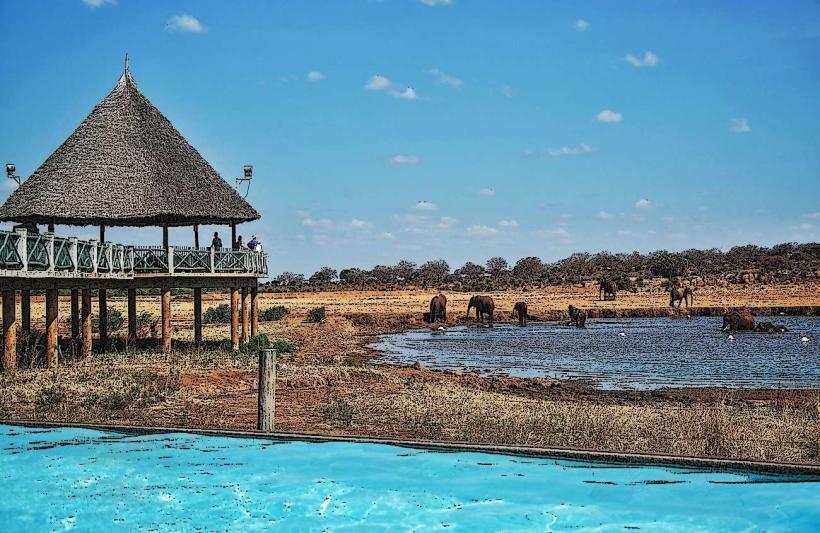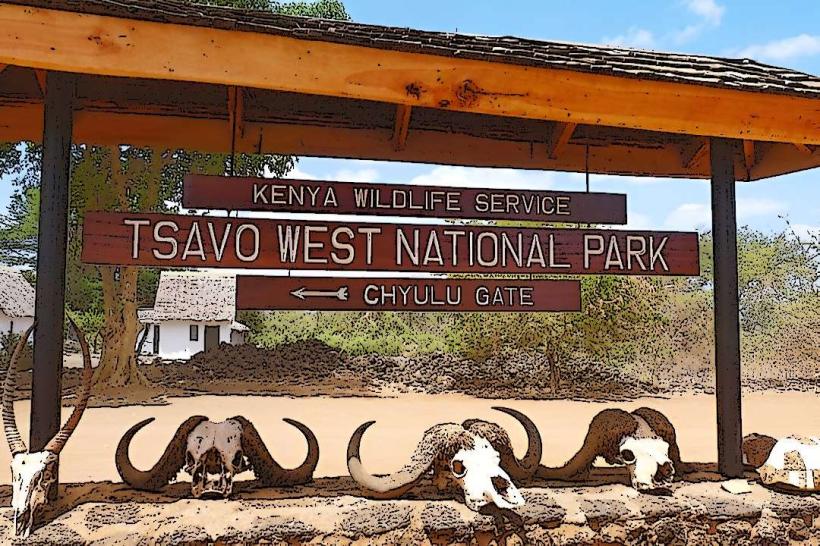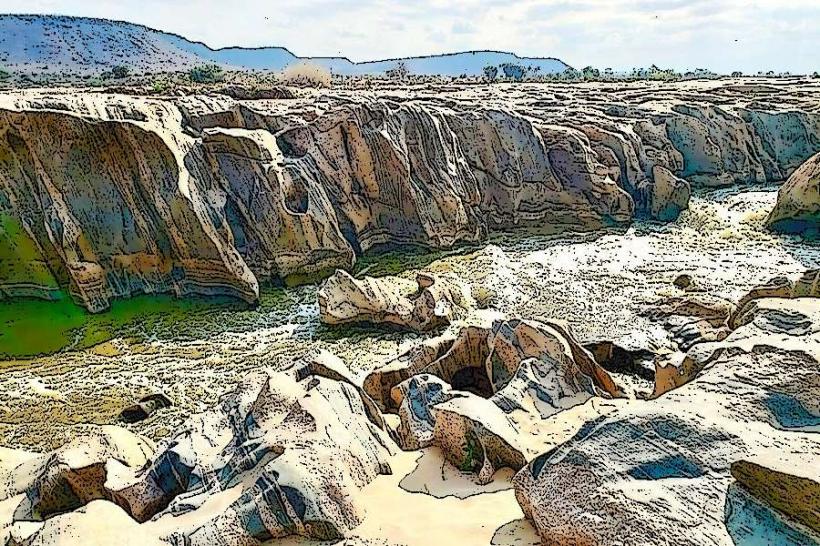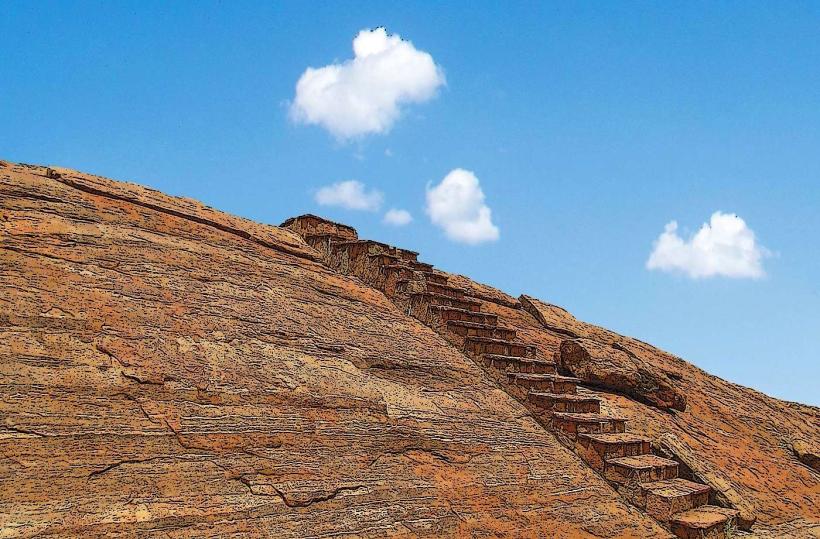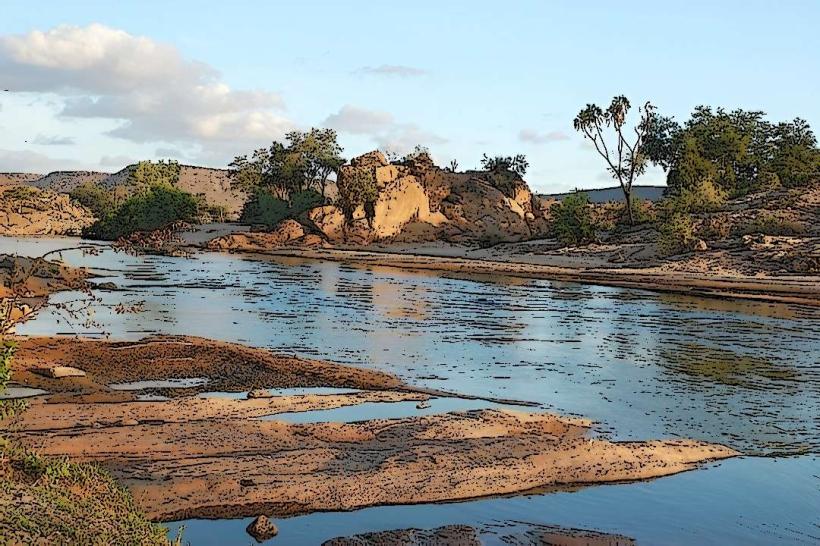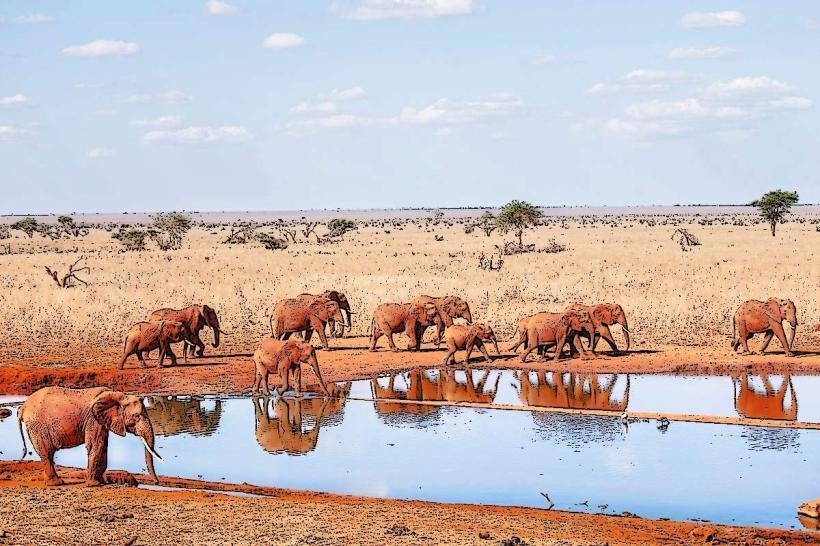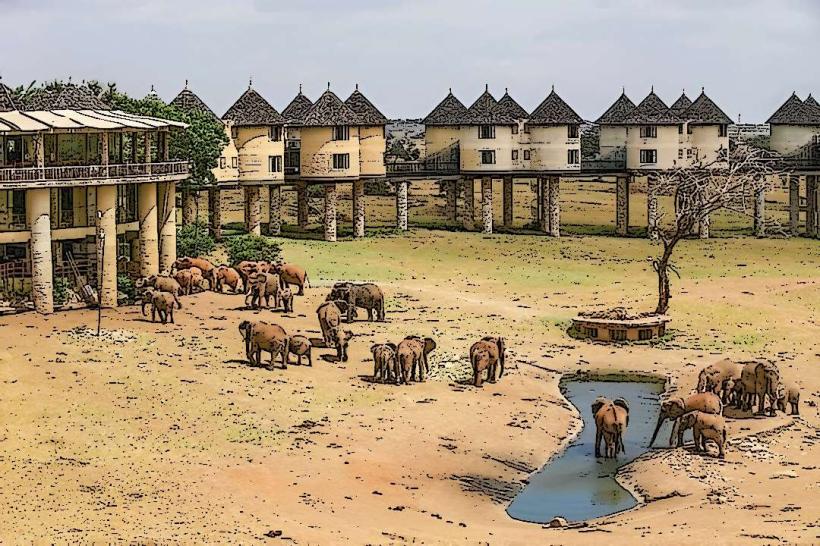Information
Landmark: Tsavo East National ParkCity: Voi
Country: Kenya
Continent: Africa
Tsavo East National Park, Voi, Kenya, Africa
Tsavo East National Park is one of Kenya's oldest and largest national parks, spanning over 13,747 square kilometers (5,270 square miles) of vast, rugged, and remote wilderness. It is located in the southeastern part of the country, mainly in Taita-Taveta County, and is part of the larger Tsavo Conservation Area. The park is famous for its large elephant population, its distinctive red-colored soil, and its rich biodiversity.
Location
Region: Southeastern Kenya, spanning Taita-Taveta County and bordering the Chyulu Hills, with parts of the park lying near the border with Tanzania.
Proximity: It is located about 230 kilometers (143 miles) southeast of Nairobi and around 150 kilometers (93 miles) north of Mombasa. The park is accessible by road from both Nairobi and Mombasa, making it a popular safari destination for both locals and international tourists.
History and Establishment
Established: The park was gazetted in 1948.
Named After: The park is named after the Tsavo River, which flows through it and forms a key natural feature.
Historical Significance: Tsavo East is historically known for the infamous Tsavo Man-Eaters-a pair of maneless lions that killed over 130 workers constructing the Kenya-Uganda railway in the late 19th century. This incident became one of the most notorious tales of human-wildlife conflict in history.
Geography and Landscape
The park is a vast and varied landscape with unique topographical features:
Savannah Grasslands: The park is mostly dominated by dry savannah, dotted with shrubbery, scattered acacia trees, and seasonal riverbeds (luggas).
Volcanic Hills: The area is shaped by volcanic activity, and you can see rocky outcrops, lava flows, and the Chyulu Hills, which rise to around 2,000 meters (6,600 feet).
Rivers and Waterholes: Key water sources include the Tsavo River, Galana River, and numerous natural springs and waterholes, which become a focal point for wildlife, especially during dry seasons.
Red Soil: The famous red soil of Tsavo gives the park a distinctive look, and it is often associated with the park's famous "red elephants" (elephants that dust themselves with the red soil).
Wildlife
Tsavo East is home to a wide variety of wildlife and is particularly famous for its large elephant population. Visitors can expect to see:
Elephants: Tsavo East is home to some of the largest elephant herds in Kenya, and it is famous for its red elephants-elephants that dust themselves with the park’s iron-rich red soil, giving them a unique reddish hue.
Big Cats: Tsavo East is known for its populations of lions, leopards, and cheetahs. The park’s lion population, once notorious for the man-eating behavior of the "Tsavo Lions," remains healthy, with the lions often seen on game drives.
Antelopes: Species like Grant’s gazelle, Zebra, Gerenuk, Waterbuck, and Impala are common throughout the park.
Predators: The park is home to predators such as hyenas, jackals, and crocodiles (especially along the riverbanks).
Birdlife: Tsavo East is also an excellent destination for birdwatching. Over 500 species of birds have been recorded, including Secretary birds, eagles, hornbills, and flamingos (seasonally at waterholes).
Reptiles and Amphibians: The park also has a variety of reptiles, including pythons, monitor lizards, and several species of snakes.
Activities and Attractions
Game Drives: Tsavo East offers exciting game drives, with vast open plains providing great visibility for spotting wildlife. The park is less crowded compared to other parks like the Maasai Mara, allowing for a more tranquil safari experience.
Birdwatching: With over 500 species of birds, Tsavo East is a birdwatcher's paradise, especially during the migratory season. The rivers, swamps, and woodlands attract numerous bird species.
The Yatta Plateau: The Yatta Plateau, one of the world’s longest lava flows, stretches over 300 kilometers (186 miles) and provides an incredible view of the park.
Mzima Springs: Though more famous in Tsavo West, the Mzima Springs complex (which is also partly located in Tsavo East) feeds into the Tsavo River, creating lush green pockets in the otherwise dry landscape and supporting abundant wildlife.
Cultural Visits: Visitors can visit the nearby Taita and Kamba communities, who have a rich cultural heritage tied to the region’s history and landscape.
Photography: Tsavo East’s dramatic landscapes and abundant wildlife make it a perfect location for wildlife and landscape photography.
Accommodation
The park offers a range of accommodations, including:
Lodges: Tsavo East has several lodges and campsites located near waterholes and scenic spots, such as Voi-wildlife-lodge_voi" class="underline">Voi Wildlife Lodge and Satao Elerai Safari Camp.
Camping: For a more immersive experience, visitors can camp in designated areas within the park.
Luxury Tented Camps: These offer more luxurious and private safari experiences, with tents set up in scenic locations.
Accessibility
By Road: Tsavo East is easily accessible via the Nairobi-Mombasa Highway. The Voi Gate is the main entry point for visitors coming from Nairobi or Mombasa.
By Air: There are airstrips within the park, and visitors can fly into Voi Airstrip or Tsavo East Airstrip using chartered flights.
Conservation Efforts
Tsavo East, part of the Tsavo Conservation Area, is a key area for wildlife conservation in Kenya. It is managed by Kenya Wildlife Service (KWS), and there have been several initiatives to preserve the park’s unique ecosystems and species. Key efforts include:
Anti-poaching patrols.
Human-wildlife conflict mitigation programs.
Restoration of wildlife corridors.
Best Time to Visit
Dry Seasons (June to October and January to February) are the best times for game viewing, as animals congregate around water sources.
Rainy Seasons (March to May and November to December) can bring lush landscapes, but some roads may become impassable.
Conclusion
Tsavo East National Park is one of Kenya’s premier safari destinations, offering vast landscapes, rich wildlife, and the chance to experience one of Africa’s most iconic wilderness areas. With its iconic "red elephants," abundant wildlife, and stunning scenery, Tsavo East remains a must-visit park for wildlife enthusiasts, photographers, and those seeking an authentic African safari experience.

